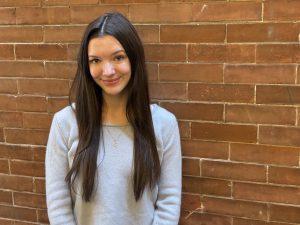
In the early evening of 5 March, the Department of Economics will host its annual Undergraduate Awards of Excellence event. The awards recognize superb undergraduate writing and scholarship undertaken in 2023 and 2024. Third-year Trinity College student Catherine Champion will be one of the recipients.
Catherine’ experience shows that winning an award of excellence from the department often, but not always, involves more than finding a prize on Award Explorer and completing an application package. It’s a rather complicated process, but one that can be demystified.
Catherine won one of the Department of Economics Best Paper Awards. That’s where the first complicated detail arises. The best paper awards were created to recognize excellent submissions made to the Smith Family Scholarship competition.
That means, only students who are eligible for the Smith Family award are eligible for the best paper awards. Students who are eligible must be enrolled in Major or Specialist program with a focus on economic policy and/or history. They must also maintain a 3.0 GPA. Eligible students are notified about how and when to apply through an email from the undergraduate administration. Students who don’t check their university email accounts miss the deadline.
And that deadline needs to be respected with planning and scheduling. The Smith Family Award requires applicants to submit an essay of up to 1,000 words that describes a current economic policy issue with recommendations for how to address the issue. Op-ed pieces in popular press like The Economist, or Globe and Mail, are good models. The policy issue does not have to be Canadian, but if its focus is on an international issue, applicants must write for a Canadian audience.
“The topic I chose was The Rising Cost of Election Campaigns in America is Perpetuating Wealth Inequality,’” Catherine explained. “Basically, my thesis is that election costs are increasing substantially across America over time. For candidates to fund their campaigns, they turn to the wealthy for financing. In that transaction, they give up political power in exchange for financing.”
The topic is immediately timely, but Catherine did the writing almost six months ago, highlighting that watching data and trends does result in accurate predictions. Writing the paper for the award competition may well be inspired by course work, but it is extracurricular, meaning that Catherine had to do an informal cost-benefit analysis to find the time to write and risk that time in the hope her efforts might pay off.
“I wrote this essay in September,” she said. “You’re trying to readjust to school after the summer, and it definitely takes time to write an essay, but it’s about making the time to take advantage of opportunities that are presented to you. The value of that outweighs sleeping a couple of extra hours in the long run.”
Writing the essay that ultimately won one of the awards is not Catherine’s first foray into exploring economic policy outside coursework.
“Two clubs I’m passionate about are the Trinity Women in Leadership Program and the She Economist Club,” Catherine said. “Both focus on empowering women and supporting them in their careers.”
Interested in a future career in wealth management, Catherine believes participation in these two clubs has also taught her much about economic policy and its implications.
“An interesting fact is that the largest wealth transfer is expected in the next 20 years with the baby boomer population,” she explained. “Women tend to outlive men across North America, so this wealth transfer will likely see many women in positions of monetary power. If we’re going to have this transfer of wealth, women will want to be seen within the banking industry. It’s a powerful opportunity that we should take advantage of now.”
Checking email and Awards Explorer are both important for students looking to strengthen their financial bottom line and their resumes with a scholastic award. While it’s not common, there is award money that goes unclaimed due to a lack of applications. University administration encourages students to apply, even if they don’t feel they can win.
“You never know if you can win until you try,” said Johnny Tong, Undergraduate Assistant at the Department of Economics. “Sometimes, the only thing standing between you and success is taking that first step.”
Return to the Department of Economics website.
Scroll more news.
